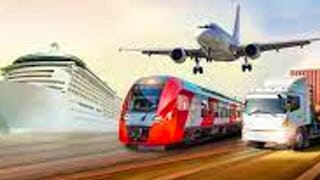- Browse
- Heavy Oil Transportation
Results for "heavy+oil+transportation"
 Status: NewNewStatus: Free TrialFree Trial
Status: NewNewStatus: Free TrialFree TrialSkills you'll gain: Power Electronics, Thermal Management, Electrical Safety, Electrical Power, Building Codes, Electric Power Systems, Electronic Systems, Electrical Equipment, Electrical Systems, Electronic Components, Energy and Utilities, HVAC, Basic Electrical Systems, Maintenance, Repair, and Facility Services, Sustainable Technologies, Environmental Issue, Environment and Resource Management, Environmental Regulations, Environmental Engineering and Restoration, Geospatial Information and Technology
4.3·Rating, 4.3 out of 5 stars244 reviewsIntermediate · Specialization · 1 - 3 Months
 Status: NewNewStatus: Free TrialFree TrialK
Status: NewNewStatus: Free TrialFree TrialKKhalifa University
Skills you'll gain: Environmental Management Systems, Environment Health And Safety, Environmental Monitoring, Accident Reporting, Safety Training, Occupational Safety and Health Administration (OSHA), Fire And Life Safety, Accident Prevention, Hazardous Waste Operations And Emergency Response Standard (HAZWOPER), Environmental Regulations, Environmental Engineering, Environmental Laws, Environmental Resource Management, Risk Management, Risk Management Framework, Environmental Engineering and Restoration, Risk Analysis, Environment and Resource Management, Engineering Management, Engineering
4.8·Rating, 4.8 out of 5 stars153 reviewsBeginner · Specialization · 1 - 3 Months
 Status: Free TrialFree TrialL
Status: Free TrialFree TrialLL&T EduTech
Skills you'll gain: Equipment Design, Manufacturing Processes, Plant Operations and Management, Hydraulics, Manufacturing Operations, Chemical Engineering, Production Process, Process Engineering, Control Systems, Manufacturing Standards, Automation, Internet Of Things, Materials science, Manufacturing and Production, Mechanical Engineering, Process Control, Quality Assurance, Safety Standards, Petroleum Industry, Engineering Practices
4.6·Rating, 4.6 out of 5 stars41 reviewsIntermediate · Specialization · 1 - 3 Months
 Status: Free TrialFree TrialL
Status: Free TrialFree TrialLL&T EduTech
Skills you'll gain: Structural Engineering, Construction Engineering, Construction, Engineering Management, Equipment Design, Construction Management, Engineering Practices, Hydraulics, Architecture and Construction, Mechanics, Safety Standards, Engineering, Mechanical Design, Engineering Calculations, Civil Engineering, Structural Analysis, Mechanical Engineering, Hazard Analysis, Construction Inspection, Engineering Analysis
4.6·Rating, 4.6 out of 5 stars14 reviewsAdvanced · Specialization · 3 - 6 Months
 Status: Free TrialFree TrialL
Status: Free TrialFree TrialLL&T EduTech
Skills you'll gain: Construction Engineering, Civil Engineering, Construction, Building Services Engineering, Civil and Architectural Engineering, HVAC, Traffic Flow Optimization, Transportation Operations, Architecture and Construction, Electrical Systems, Public Works, Construction Management, Engineering Software, Engineering Design Process, Structural Analysis, Sustainable Engineering, Building Design, Land Development, Sustainable Development, Facility Management
4.1·Rating, 4.1 out of 5 stars14 reviewsAdvanced · Specialization · 3 - 6 Months
 Status: Free TrialFree TrialL
Status: Free TrialFree TrialLL&T EduTech
Skills you'll gain: Oil and Gas, Petroleum Industry, Hazard Analysis, Safety Standards, Environmental Resource Management, Energy and Utilities, Environmental Regulations, Environment Health And Safety, Big Data, Plant Operations and Management, Waste Minimization, Process Engineering, Chemical Engineering, Risk Analysis, Environmental Engineering, Failure Mode And Effects Analysis, Data Management, Pump Stations, Data Processing, Process Control
4.6·Rating, 4.6 out of 5 stars187 reviewsAdvanced · Specialization · 3 - 6 Months
What brings you to Coursera today?
 Status: Free TrialFree Trial
Status: Free TrialFree TrialSkills you'll gain: Traffic Flow Optimization, Construction Inspection, Building Codes, Construction Engineering, Construction, Construction Management, Civil Engineering, Stormwater Management, Civil and Architectural Engineering, Hydrology, Engineering Practices, Hydraulics, Structural Analysis, Materials science, Engineering Plans And Specifications, Laboratory Testing, Engineering Software, Engineering Design Process, Plant Operations and Management, Safety Standards
4.5·Rating, 4.5 out of 5 stars8 reviewsAdvanced · Specialization · 3 - 6 Months
 Status: Free TrialFree TrialL
Status: Free TrialFree TrialLL&T EduTech
Skills you'll gain: Civil Engineering, Construction Engineering, Land Development, Building Information Modeling, Construction, Construction Management, Capacity Management, Capacity Planning, Building Design, Building Services Engineering, Facility Management, Facility Repair And Maintenance, Landscape Architecture, Construction Estimating, Architecture and Construction, Environmental Engineering, Energy and Utilities, Architectural Design, Engineering Plans And Specifications, Traffic Flow Optimization
4.8·Rating, 4.8 out of 5 stars9 reviewsIntermediate · Specialization · 1 - 3 Months
 Status: NewNewStatus: Free TrialFree Trial
Status: NewNewStatus: Free TrialFree TrialSkills you'll gain: Supply Chain, Logistics, Supply Chain Management, Logistics Management, Supply Chain Planning, Performance Measurement, Transportation Management, Operational Efficiency, Operations Management, Business Operations, Transportation Operations, Supply Chain Systems, E-Commerce, Systems Thinking, Business Planning, Market Analysis, Process Design, Supplier Management, Business, Business Administration
4.7·Rating, 4.7 out of 5 stars43 reviewsBeginner · Specialization · 1 - 3 Months
 Status: NewNewStatus: FreeFreeA
Status: NewNewStatus: FreeFreeAAmazon Web Services
Skills you'll gain: Amazon Web Services, Virtual Private Networks (VPN), Hybrid Cloud Computing, Virtual Networking, Network Architecture, Cloud-Based Integration
Beginner · Course · 1 - 4 Weeks
 Status: Free TrialFree TrialR
Status: Free TrialFree TrialRRice University
Skills you'll gain: Mechanics, Torque (Physics), Physics, Problem Solving, Mechanical Engineering, Engineering Calculations, Calculus, Engineering Analysis, Physical Science, Mathematical Modeling, Algebra, Applied Mathematics, Geometry, Trigonometry
4.7·Rating, 4.7 out of 5 stars292 reviewsIntermediate · Specialization · 1 - 3 Months
 Status: Free TrialFree TrialU
Status: Free TrialFree TrialUUniversidad Nacional Autónoma de México
Skills you'll gain: Energy and Utilities, Radiation Protection, Waste Minimization, Process Engineering, Materials science, Chemical Engineering, Production Process, Manufacturing Processes, Engineering Design Process, Mechanical Engineering, Engineering Calculations, Control Systems, Manufacturing and Production, Environmental Engineering, Cost Estimation, Chemistry, Environment and Resource Management, Natural Resource Management, Safety Standards, Mathematical Modeling
4.9·Rating, 4.9 out of 5 stars31 reviewsIntermediate · Specialization · 3 - 6 Months
In summary, here are 10 of our most popular heavy+oil+transportation courses
- Electric Vehicle Systems and Technologies: Coursera
- Health, Safety, and Environmental (HSE) Engineering: Khalifa University
- Heavy Manufacturing: L&T EduTech
- Strategies for Heavy Lifting: L&T EduTech
- Infrastructure for Transportation Systems: L&T EduTech
- Petroleum Engineering with AI Applications: L&T EduTech
- Highway Planning, Pavement Design and Construction: L&T EduTech
- Airport Infrastructure Development: L&T EduTech
- Mastering Logistics & Supply Chain Strategy Skills: EDUCBA
- AWS Transit Gateway Getting Started: Amazon Web Services










